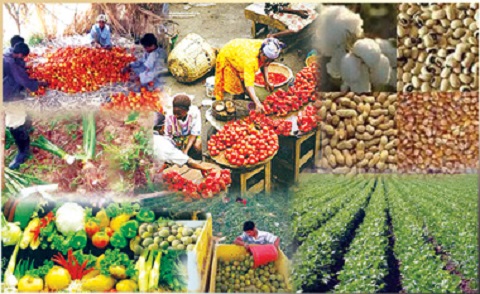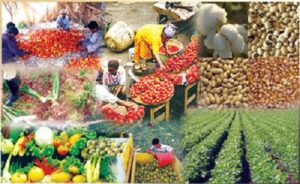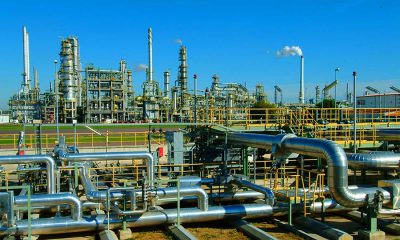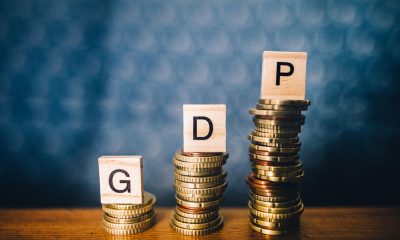Economy
Nigeria’s Non-Oil Economy Records Slight Growth


**As FG Policies Sustain Rising GDP Figures In Agric, Solid Minerals Sectors
By Modupe Gbadeyanka
Third Quarter GDP figures released by the National Bureau of Statistics (NBS) has revealed a consistent growth in Agric and Solid Mineral sectors, indicating the success of the Buhari administration’s economic policies even though overall economy is still in recession.
The over-riding impact of the oil and gas sector, where vandalism and sabotage of critical installations negatively affected production output, explains the persistence of the recession, as the non-oil economy posted a very slight growth.
However, efforts to resolve the Niger Delta situation are continuing as the Federal Government has opened several channels of communication with all relevant groups in the Niger Delta.
Also, urgent fiscal and monetary measures to spur the economy back to overall positive territory are certainly in the offing including those targeting manufacturing.
According to Special Adviser to the President on Economic Matters, Dr Adeyemi Dipeolu on the latest NBS reports, “The third quarter results just released by the National Bureau of Statistics show that the Nigerian economy is still in recession.
“Growth in Gross Domestic Product fell by -2.24% in the third quarter as compared to the decline of -2.07 percent experienced in the second quarter.
“The slight deterioration in national economic performance owes largely to the continued poor performance of the oil and gas sector which worsened to -22.01% in the third quarter as compared to -17.48% in the second quarter of 2016. The immediate cause of this, as is now generally recognised, is the steep decline in oil and gas production in the third quarter of 2016 due to acts of vandalism and sabotage of oil export facilities.”
He said remote causes include the continued outsized influence of the oil and gas sector on the rest of the economy as typified by its contribution to government revenue and foreign exchange earnings, which continue to be important motors of economic activity.
According to him, due to time lags, it is still too early for policy interventions of the Federal Government to begin to impact fully on economic activity.
There are however some ‘green shoots’ of economic recovery beginning to emerge.
To start with, on-going consultations to bring lasting peace to the Niger Delta have enabled an increase in oil and gas production which if sustained at current prices, will bring a measure of relief to the economy.
Other key sectors of the economy showed encouraging signs of improvement.
The growth in the non-oil economy although still weak at 0.03% showed a return to positive territory after two consecutive quarters of negative growth. This was partly due to the continued good performance of agriculture and the solid minerals, two sectors prioritised by the Federal Government.
Agriculture grew by 4.54% in the quarter under consideration of which growth in crop production at nearly 5% was at its highest since the first quarter of 2014. Growth in the solid mineral sector averaged about 7%.
The financial sector rebounded quite strongly in the period under review growing by 2.85% from a negative growth of -13.24% in the second quarter. The recently approved first tranche of $600m to be borrowed from the African Development Bank will also provide some relief in budgetary terms and supplement capital inflows. Indeed, there was a slight uptick of capital inflows into the economy in the third quarter of 2016. Overall capital inflows in the third quarter of 2016 increased by 74.84% over the second quarter.
The performance of the manufacturing sector continued to be of concern given its key role in value addition and job creation in the economy. It is expected however that with greater local sourcing of raw materials, expected improvements in infrastructure, especially power and reductions in the cost of doing business, this sector will soon experience a sustained improvement in its contribution to the national economy.
Similarly, while inflation is still high at 18.3% on a year-on-year basis it has begun to level out on a month-on-month basis and should enable the deployment of more policy tools to support growth and employment. Indeed, growth of headline inflation slowed down appreciably from 13.8% in May to as low as 1.70% in September.
The year to date growth is about -1.58% and is set to improve given some of the points mentioned earlier especially regarding agriculture, oil and gas, and power supply. In addition, there have also been reductions in the rate of contraction of household and government consumption expenditure. Household consumption expenditure fell for instance by -3.25% in the third quarter of 2016 as compared to -6.0% recorded in the second quarter.
The ratio of investment to GDP also showed a notable improvement rising by 7.6% in the third quarter of 2016 as compared to a contraction of -7.4% in the fourth quarter of 2015.
The Strategic Implementation Plan for the implementation of the 2016 Budget of Change prioritised capital expenditures for power, roads and rail as well as social investments. In addition to creating jobs and promoting social inclusion, these expenditures will also provide a stimulus by putting money in the hands of people. The usual economic activity that takes place in the Yuletide season will also likely have a positive impact on the wholesale and retail trade sector.
Overall therefore, it is expected that these factors which will be underpinned by the policies to be unveiled in the Economic Recovery and Growth Plan, ERGP, to be adopted before the end of the year, will lend further momentum to on-going efforts to revitalise and reposition the economy.”
Economy
Naira Down Again at NAFEX, Trades N1,359/$1

By Adedapo Adesanya
The Naira further weakened against the Dollar in the Nigerian Autonomous Foreign Exchange Market (NAFEX) for the fourth straight session this week on Thursday, February 26.
At the official market yesterday, the Nigerian Naira lost N3.71 or 0.27 per cent to trade at N1,359.82/$1 compared with the previous session’s N1,356.11/$1.
In the same vein, the local currency depreciated against the Pound Sterling in the same market window on Thursday by N8.27 to close at N1,843.23/£1 versus Wednesday’s closing price of N1,834.96/£1, and against the Euro, it crashed by N8.30 to quote at N1,606.89/€1, in contrast to the midweek’s closing price of N1,598.59/€1.
But at the GTBank forex desk, the exchange rate of the Naira to the Dollar remained unchanged at N1,367/$1, and also at the parallel market, it maintained stability at N1,365/$1.
The continuation of the decline of the Nigerian currency is attributed to a surge in foreign payments that have outpaced the available Dollars in the FX market.
In a move to address the ongoing shortfall at the official window, the Central Bank of Nigeria (CBN) intervened by selling $100 million to banks and dealers on Tuesday.
However, the FX support failed to reverse the trend, though analysts see no cause for alarm, given that the authority recently mopped up foreign currency to achieve balance and it is still within the expected trading range of N1,350 and N1,450/$1.
As for the cryptocurrency market, major tokens posted losses over the last 24 hours as traders continued to de-risk alongside equities following Nvidia’s earnings-driven pullback, with Ripple (XRP) down by 2.7 per cent to $1.40, and Dogecoin (DOGE) down by 1.6 per cent to $0.0098.
Further, Litecoin (LTC) declined by 1.3 per cent to $55.87, Ethereum (ETH) slipped by 0.9 per cent to $2,036.89, Bitcoin (BTC) tumbled by 0.7 per cent to $67,708.21, Cardano (ADA) slumped by 0.6 per cent to $0.2924, and Solana (SOL) depreciated by 0.4 per cent to $87.22, while Binance Coin (BNB) gained 0.4 per cent to sell for $629.95, with the US Dollar Tether (USDT) and the US Dollar Coin (USDC) closing flat at $1.00 each.
Economy
Crude Oil Falls as Geopolitical Risk Around Iran Clouds Supply Outlook

By Adedapo Adesanya
Crude oil settled lower on Thursday as investors tracked developments in talks between the United States and Iran over the latter’s nuclear programme, weighing potential supply concerns if hostilities escalate.
Brent crude futures lost 10 cents or 0.14 per cent to close at $70.75 a barrel, while the US West Texas Intermediate (WTI) crude futures depreciated by 21 cents or 0.32 per cent to $65.21 a barrel.
The US and Iran held indirect talks in Geneva on Thursday over their long-running nuclear dispute to avert a conflict after US President Donald Trump ordered a military build-up in the region.
Prices had gained earlier in the session after media reports indicated the talks had stalled over US insistence on zero enrichment of uranium by Iran, as well as a demand for the delivery of all 60 per cent-enriched uranium to the US.
However, prices then retreated after the two countries extended talks into next week, reducing the immediate strike potential.
Iran’s Foreign Minister, who confirmed talks will continue next week, said Thursday’s talks were the most serious exchanges with the US yet, saying Iran clearly laid out its demand for lifting sanctions and the process for relief.
His counterpart from Oman, who is handling the talks, said significant progress was made in Thursday’s talks. The Omani minister’s upbeat assessment followed indirect talks between Iranian Foreign Minister and US envoys Steve Witkoff and Jared Kushner in Geneva, with one session in the morning and the second in the afternoon.
He will also hold talks with US Vice President JD Vance and other US officials in Washington on Friday.
The Trump administration has insisted that Iran’s ballistic missile program and its support for armed groups in the region must be part of the negotiations.
The American President said on February 19 that Iran must make a deal in 10 to 15 days, warning that “really bad things” would otherwise happen.
On Tuesday, he briefly laid out his case for a possible attack on Iran in his State of the Union speech, underlining that while he preferred a diplomatic solution, he would not allow Iran to obtain a nuclear weapon.
Meanwhile, the US continues to amass forces in the Middle Eastern region, with the military saying it is prepared to execute orders given by the US President.
Economy
Why Transparency Matters in Your Choice of a Financial Broker

Choosing a Forex broker is essentially picking a partner to hold the wallet. In 2026, the market is flooded with flashy ads promising massive leverage and “zero fees,” but most of that is just noise. Real transparency is becoming a rare commodity. It isn’t just a corporate buzzword; it’s the only way a trader can be sure they aren’t playing against a stacked deck. If a broker’s operations are a black box, the trader is flying blind, which is a guaranteed way to blow an account.
The Scam of “Zero Commissions”
The first place transparency falls apart is in the pricing. Many brokers scream about “zero commissions” to get people through the door, but they aren’t running a charity. If they aren’t charging a flat fee, they are almost certainly hiding their profit in bloated spreads or “slippage.” A trader might hit buy at one price and get filled at a significantly worse one without any explanation. This acts as a silent tax on every trade. A transparent broker doesn’t hide the bill; they provide a live, auditable breakdown of costs so the trader can actually calculate their edge.
The Conflict of Market Making
It is vital to know who is on the other side of the screen. Many brokers act as “Market Makers,” which is a polite way of saying they win when the trader loses. This creates a massive conflict of interest. There is little incentive for a broker to provide fast execution if a client’s profit hurts their own bottom line. A broker with nothing to hide is open about using an ECN or STP model, simply passing orders to the big banks and taking a small, visible fee. If a broker refuses to disclose their execution model, they are likely betting against their own clients.
Regulation as a Safety Net
Transparency is worthless without an actual watchdog. A broker that values its reputation leads with its licenses from heavy-hitters like the FCA or ASIC. They don’t bury their regulatory status in the fine print or hide behind “offshore” jurisdictions with zero oversight. More importantly, they provide proof that client funds are kept in segregated accounts. This ensures that if the broker goes bust, the money doesn’t go to their creditors—it stays with the trader. Without this level of openness, capital is essentially unprotected.
The Withdrawal Litmus Test
The ultimate test of a broker’s transparency is how they handle the exit. There are countless horror stories of traders growing an account only to find that “technical errors” or vague “bonus terms” prevent them from withdrawing their money. A legitimate broker has clear, public rules for getting funds out and doesn’t hide behind a wall of unreturned emails. If a platform makes it difficult to see the exit strategy, it’s a sign that the front door should have stayed closed.
Conclusion
In 2026, honesty is the most valuable feature a broker can offer. It is the foundation that allows a trader to focus on the charts instead of worrying if their stops are being hunted. Finding a partner with clear pricing, honest execution, and real regulation is the first trade that has to be won. Flashy marketing is easy to find, but transparency is what actually keeps a trader in the game for the long haul.
-

 Feature/OPED6 years ago
Feature/OPED6 years agoDavos was Different this year
-
Travel/Tourism10 years ago
Lagos Seals Western Lodge Hotel In Ikorodu
-

 Showbiz3 years ago
Showbiz3 years agoEstranged Lover Releases Videos of Empress Njamah Bathing
-

 Banking8 years ago
Banking8 years agoSort Codes of GTBank Branches in Nigeria
-

 Economy3 years ago
Economy3 years agoSubsidy Removal: CNG at N130 Per Litre Cheaper Than Petrol—IPMAN
-

 Banking3 years ago
Banking3 years agoSort Codes of UBA Branches in Nigeria
-

 Banking3 years ago
Banking3 years agoFirst Bank Announces Planned Downtime
-

 Sports3 years ago
Sports3 years agoHighest Paid Nigerian Footballer – How Much Do Nigerian Footballers Earn



















